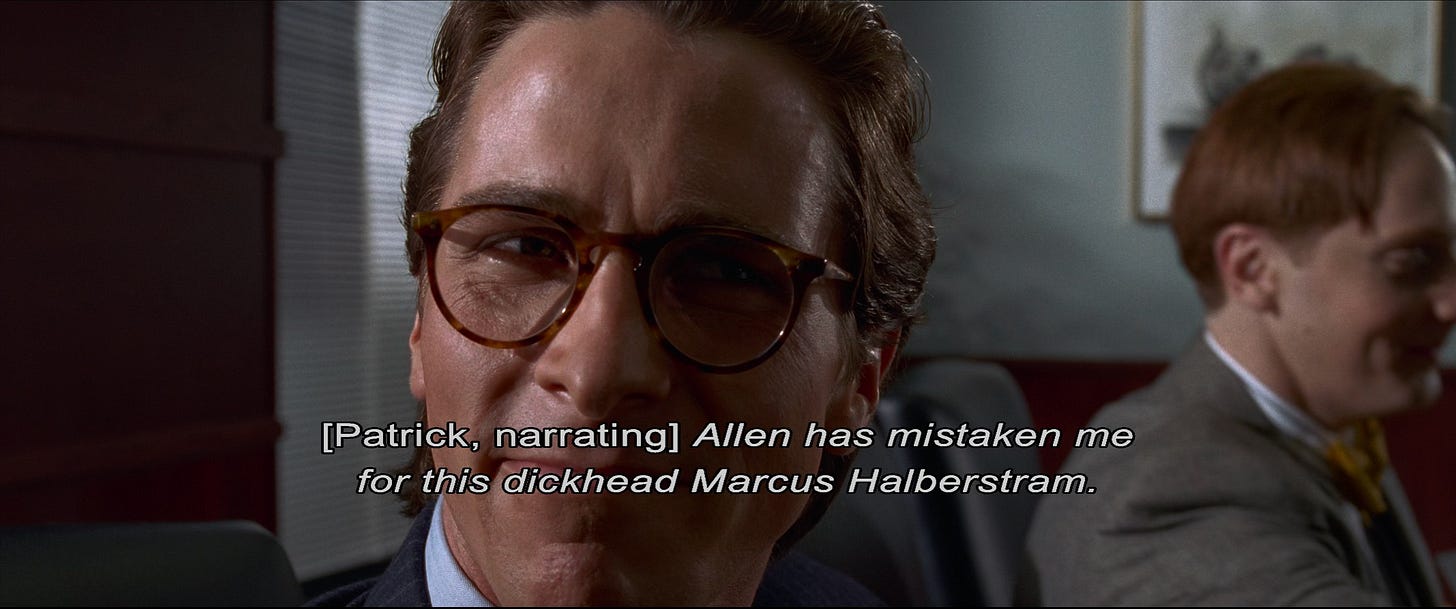What if Patrick Bateman is all of us?
Welcome to the 2000s Film Series: looking back 25 years later. Film #1
I’ve been on this film journey of rewatching my favorite movies from the year 2000, aka 25 years ago (what?!), and when I watched American Psycho again after so many years, I found it wild how a film from the early 2000s still resonates so much with today’s society. The film, directed by Mary Harron, is based on the novel of the same name by Bret Easton Ellis, published in 1991.
Be warned: spoilers ahead.
What got me thinking wasn’t whether Patrick Bateman is an actual murderer or if it’s all in his head, but rather these three disturbing themes that feel painfully relevant in today’s world:
1) Influencer Culture
Patrick Bateman is self-obsessed with maintaining a perfect image, living to present himself as flawless to his peers, much like how people curate their lives on social media today. He is the perfect example of identity performance, his self is never truly authentic but rather a performance designed to show off wealth and status, mirroring the pressures of today’s influencer culture. Some of the ways the film explores this is through the pettiness of who has enough status to accomplish a reservation at the most expensive restaurant, or through the ridiculousness of the characters when showing off their business cards and quietly competing to see who has the best one.
Another representation of identity performance is the recurrence of the characters being mistaken for someone else, which in this context is totally normal as “those guys” all represent the exact same thing — they all have the same haircut style, same luxury suits and glasses, same job title — they are all the “same guy”, so it’s normal they all get mixed up at some point.
Nowadays, we see this translated into how badly some people want to be part of the influencer culture. They look at others' lives as inspiration to build their own best self, idolizing those they believe are what they aspire to be, such as influencers or celebrities. Rather than stand apart, most people are following the same trends and behaving according to socially accepted conventions. Similar to Patrick Bateman in his pursuit of being the best, most unique, and original version of himself, ultimately he’s performing to belong to conformity.
2) Hyper-Consumerism
The characters have an obsession with luxury brands, social prestige, and wealth.
The hyper-focus on these status symbols is central to the movie, almost like a character itself.
Today, this is represented by the obsession with fulfilling capitalism-driven needs, like owning the latest tech (is a new iPhone truly necessary every year?) or becoming a relatable fashion icon (how many trends can we keep up with?). This creates a cycle of comparison and dissatisfaction, feeding the illusion that happiness comes from purchasing the latest iPhone or that luxury product we can’t truly afford.
3) Desensitization to Violence
This point was what got me the most. Bateman’s murders are met with total indifference by the other characters. When he confesses the crimes to his lawyer, he is dismissive and even mistakes Patrick for another guy (which connects to the identity performance point mentioned above). The same happens when an acquaintance sees him carrying a body in a bag, putting it in the trunk of a car, and is completely oblivious to it. Instead, they are only interested in the brand of the bag (Jean Paul Gaultier, FYI).
This portrays how the characters are desensitised to violence and ready to focus on something else. Today, we can see this perfectly in how society often ignores or glamorizes violent behavior. Who doesn’t like a good true crime podcast or a war thriller? Well, I do. And the worst part is how violence in the media became so familiar, resulting in a general apathy towards wars and human suffering. When violence becomes this familiar, it translates into a lack of empathy. Without empathy, what is the essence of being human? Probably just a glamorized psychopathy, like Patrick Bateman, who is detached from the reality of his shared humanity.
Patrick Bateman isn’t just an exaggerated psychopath but a reflection of modern society taken to the extreme. Maybe we don’t all go around murdering people (hopefully), but for me, the film is about all of us, trapped in a system that rewards performance over authenticity, hyperconsumerism over fulfillment, and this need for continuous empty content scrolling. The scariest part of the film isn’t Bateman himself, but the fact that no one around him even cares.





Ohh this is a good take regarding how he relates to contemporary influencers and their consumerism of luxury goods. I really dig this movie despite how violent it is. The end always gets me, no one like believes he did all these things.